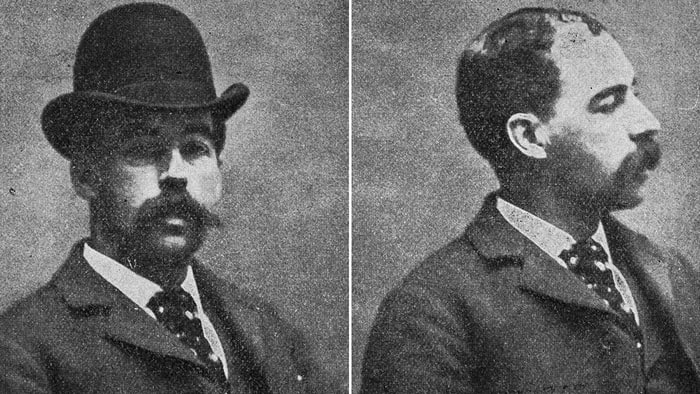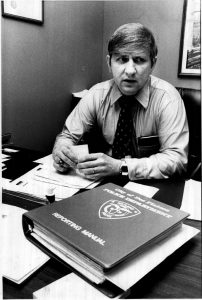Herman Webster Mudgett, commonly known as H. H. Holmes, was born in 1861 in New Hampshire.1 Mudgett was born into an affluent family and lived a very privileged life as a child. Many thought that Mudgett was unusually intelligent as a child; Mudgett showed an interest in medicine, which was one of the first signs of his psychotic behaviors, for Holmes practiced surgery on many helpless animals.2 Mudgett began his criminal life with petty acts of fraudulence and scams. One criminal act that Mudgett committed is haunting. Holmes stole corpses while as a medical student at University of Michigan in order to perform experiments on the bodies.3

Holmes later became one of America’s first serial killers. Mudgett is most commonly known for his brutal killer tactics in a specially constructed home nicknamed the “Murder Castle.” What flaws did he make? Who would commit such crimes? We are going to find out… Through criminology, specialists investigate the criminal’s mind, and acts of crime. What were the possible motives of H. H. Holmes and the flaws he made in his murders?
Mudgett was said to be an affluent, privileged child; although, there is more evidence to look for in his childhood years to show the cause of his crimes. Holmes’ mother was said to have had a terminal illness that traumatized the family. Many serial killers encounter psychological trauma early on in their life that creates a mental disorder leading to their twisted thoughts and actions. Mudgett’s mother’s illness could have been a possible cause for his psychotic behavior. Another could be that Mudgett’s mother was unable to be saved from her illness, so he wanted to join the medical field due to his hatred of doctors.
Mudgett was an extremely intelligent man, which makes him an even more terrifying figure. In 1885, Mudgett moved to Chicago and came across Elizabeth S. Holton’s drugstore at the southwest corner of South Wallace Avenue and West 63rd Street in Englewood, where he found work at a local pharmacy, and where he began using his infamous name, Dr. Henry H. Holmes.4 He worked at the pharmacy for about two years, and eventually took over the business. Holton said he proved himself to be a hardworking employee, and eventually bought the store.

With the money collected as the new owner of the local pharmacy, Holmes purchased an empty lot across from the drugstore, where construction began in 1887 on a two-story mixed-use building, with apartments on the second floor and retail spaces, including a new drugstore on the first floor.5 When Holmes declined to pay the architects or the steel company, they sued him in 1888. In 1892, he added a third floor, telling investors and suppliers that he intended to use it as a hotel during the upcoming World’s Columbian Exposition, though the hotel portion was never completed. Furniture suppliers found that Holmes was hiding their materials, for which he had never paid, in hidden rooms and passages throughout the building.6 Their search made the news, and investors for the planned hotel pulled out of the deal when a jeweler in the building showed them the articles.7 When the third floor caught fire on the night of August 13, 1893, only a few people were in the building, all employees and long-term residents. Holmes had taken out insurance policies on the building with at least four companies, all of which promptly sued rather than pay. During the 1893 Columbian Exposition, Holmes opened up his home as a hotel for visitors. Unfortunately, many guests did not survive what became known as the “Murder Castle.”8

Many of these victims were women who were seduced, lured into the “Murder Castle,” and then killed. Other victims were lured there by the offer of employment.9 Holmes did not live in Chicago for long, because many people began to catch on to his trail. With insurance companies pressing to prosecute Holmes for arson, Holmes left Chicago in July 1894 to construct another “castle” along the lines of his Chicago operation.10 If Holmes would have kept out of the many building issues of the Murder Castle, he might have been able to get away with more killings in Chicago.
In July 1894, Holmes was arrested for the first time, on the charge of selling mortgaged goods in St. Louis, Missouri.11 He was bailed out, but while in jail he met a convicted outlaw named Marion Hedgepeth, who was serving a 25-year sentence. The two planned a wild scheme to deceive an insurance company out of $10,000 by taking a policy out on Holmes and then faking his own death to receive the money. The plan became too elaborate and involved too many people, which meant a greater split of money among the group. Holmes became outraged and killed a member of the group, Benjamin Pitezel, and his entire family. Frank Geyer, a Philadelphia detective, found the decomposed bodies of the two Pitezel girls in the Pitezel house cellar after co-wrokers were suspicious that Mr. Pitezel had missed two days of work.12 After removing the bodies, Geyer noticed that one of the girl’s feet had been removed. After discovering that the girl had club foot, he theorized that the killer had cut off her feet to prevent a distinctive identification of the body.13 Holmes was reported to have visited a local pharmacy to purchase the drugs that he used to kill another member of the Pitezel family, and a repair shop to sharpen the knives he used to chop up the body before he burned it.14 The boy’s teeth and bits of bone were discovered in the home’s chimney. Holmes’ murder spree finally ended when he was arrested in Boston on November 17, 1894, after being tracked there from Philadelphia.15 In October 1895, Holmes was put on trial for the murder of Benjamin Pitezel, and was found guilty and sentenced to death.16 By then, it was evident that Holmes had also murdered the Pitezel children. Following his conviction, Holmes confessed to 27 murders in Chicago, Indianapolis, and Toronto.17 Holmes gave various contradictory accounts of his life, initially claiming innocence and later that he was possessed by Satan. On May 7, 1896, Holmes was hanged at the Philadelphia County Prison, for the murder of Pitezel family and countless other murders.18

All in all, Holmes let his impatient manner and greed get the best of him. If Holmes had been able to keep to himself, he would have been able to get away with more than he did. His motives were unclear, but the illness of his mother and his unhealthy interest in medicine have a strong correlation with the monster that was created in Chicago. Serial killers are a breed of monsters, and understanding the minds of a different breed is almost impossible. Relations and inferences can be made, but no one will ever understand why one would commit such crimes to another form of life.
- David Goldman, “Castle of Horror: The Gruesome Story of H.H. Holmes,” Biography 7, no. 5:28 (2003): 787. ↵
- David Goldman, “Castle of Horror: The Gruesome Story of H.H. Holmes,” Biography 7, no. 5:28 (2003): 789. ↵
- David Goldman, “Castle of Horror: The Gruesome Story of H.H. Holmes,” Biography 7, no. 5:28 (2003): 793. ↵
- George M. Ebehart, “New Publications,” College & Research Libraries News 64, no. 10: (2011) 680. ↵
- George M. Ebehart, “New Publications,” College & Research Libraries News 64, no. 10: (2011) 681. ↵
- George M. Ebehart, “New Publications,” College & Research Libraries News 64, no. 10: (2011) 681. ↵
- George M. Ebehart, “New Publications,” College & Research Libraries News 64, no. 10: (2011) 681. ↵
- Salem Press Encyclopedia Research Starters, 2016, s.v. “Mass and serial murders,” by Phyllis B. Gerstenfeld. ↵
- Salem Press Encyclopedia Research Starters, 2016, s.v. “Mass and serial murders,” by Phyllis B. Gerstenfeld. ↵
- Salem Press Encyclopedia Research Starters, 2016, s.v. “Mass and serial murders,” by Phyllis B. Gerstenfeld. ↵
- Salem Press Encyclopedia Research Starters, 2016, s.v. “Mass and serial murders,” by Phyllis B. Gerstenfeld. ↵
- Salem Press Encyclopedia Research Starters, 2016, s.v. “Mass and serial murders,” by Phyllis B. Gerstenfeld. ↵
- J.P. Shalloo, “Criminology,” Journal of Criminal Law and Criminology (2004), 333. ↵
- J.P. Shalloo, “Criminology,”, Journal of Criminal Law and Criminology (2004), 333. ↵
- J.P. Shalloo, “Criminology,” Journal of Criminal Law and Criminology (2004), 334. ↵
- J.P. Shalloo, “Criminology” Journal of Criminal Law and Criminology (2004), 334. ↵
- J.P. Shalloo, “Criminology,” Journal of Criminal Law and Criminology (2004), 334. ↵
- J.P. Shalloo, “Criminology,” Journal of Criminal Law and Criminology (2004), 334. ↵




92 comments
Damian Jennings
Trauma can affect the perception of individuals but we can never know as outsiders how these people are affected by it, Mr. Holmes experienced trauma at a young age; this experience transcended his morals to another realm and he began to kill. With no intent, but for the pleasure of claiming someones life. Trauma does not excuse anyone from a crime, when trauma arrives, one must seek help in order to correctly stabilize there thought process.
Lilliana Canales
The fascination you have for H.H Holmes is very evident in your article. Although wicked, I believe that Holmes is a very important figure in forensic criminology and criminal justice because he’s a primal example of a murder most foul in America. As you said in your article, had it not been for his greed and impatience, he would have gotten away with more murders.
Sofia Andrade
Although Holmes had traumatic experiences, he had so much potential to become someone great. Instead, Holmes used his intelligence and abilities to do harm to others. His greed and impatience caused him to act repulsively. It is crazy that he would use his castle to lure victims and would plan to build another one once he moved out of Chicago.
Christopher Vasquez
It’s remarkable to me that such a bright individual, such as H.H. Holmes, who had anything that anyone could have wanted, turned out to be such an evil person. Making his “castles,” he should have known that he would be caught. It’s also sad to know that children were not off the table with regards to his killing spree. One of America’s first serial killers, although having everything at birth, decided that these were not enough. It’s a shame that people can become so evil.
Hailey Rodriguez
Before reading this article I had never heard of H.H Holmes. It is chilling to know that he got away with many murders before finally being arrested for the murder of 27 people. It is truly horrid that he killed that whole family including the kids. I wonder why he would cut the young girls feet off but totally chop up the boys body. I also wonder why he would leave the teeth and bone bits in the chimney if he was so smart. The statement about serial killers being a whole different breed of monsters is an interesting approach and I completely agree.
Sabrina Hsu
Reading this article made me really think, was Holmes actually America’s first serial killer, or was he just the first known one, and if there were more before him, how many more? I really enjoyed reading this and learning about Holmes for the first time. The article was very informative and I definitely agree with the last paragraph where it says that serial killers are like a different breed of monsters, because people who do things like this truly are monsters.
Adrian Cook
This is just an all around crazy story I have never heard of. Holmes was a very smart man and I’m sure he would’ve gotten away with a lot more because he’s that good at murdering and disposing of the bodies. There must’ve been so much going through his mind each and every time he did something like that. I’m glad he was finally caught and put an end to these terrible murders.
Daniel Linstead
The thing that I find so interesting with serial killers is how they are that sick in the head that they are able to do what they do. Yes, majority of them have traumatic events when they are younger, but so do other people. Other people have traumatic events but they do so much with their lives. They make the right choices and chose to make the difference, so it would be interesting to know what causes the human brain to become a serial killer. Overall I thought this was a good article and along with all the other serial killers Holmes is a sick individual in order to kill 27 people.
Janelle Larios
I believe that I have read a little bit about this story, but then again I don’t think I have. What I found most interesting was that he created this elaborate plan to fake his own death so that he could collect his life insurance. That sort of thinking I believe I have only ever seen out of a movie. Either way what he did was inexcusable. Murdering an entire family just because he got mad and made his own death too elaborate on his part.
Jasmine Rocha
From a psychological perspective it is really interesting how not just Holmes but many other serial killers develop the mentality to kill others. Either coming from childhood trauma or just being born in that way. There’s s big events in someones life that can change what they choose to do in the future, normal people develop a dream but in the hope to help other while Holmes might have started with a dream to help others by pursing medicine but eventually changed to harm others. In the end the article mentions how Holmes was caught and in the end it seams that he let ambition get the best of him that lead to his capture in the end.